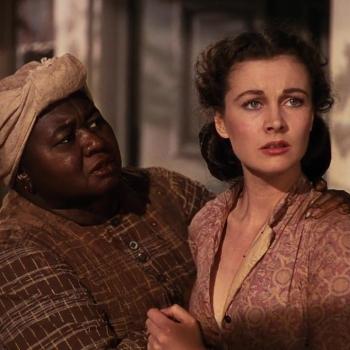Saturday night my husband and I put on our dressiest jeans and drove downtown for the live broadcast of Garrison Keillor's "A Prairie Home Companion," here in St. Louis at the beautiful Fox Theater for the week. The tall man in the red sneakers put on a fabulous show, enjoyable even from our perch at the top of house, with pianist Rich Dworsky and the Guys' All-Star Shoe Band, actors Sue Scott and Tim Russell, and sound effects guy Fred Newman all in top form. I secretly hoped for an English major bit, and I got it, along with a wonderfully aimless "Lives of the Cowboys" and the moody existential rhapsody of "Guy Noir." The monologue was not one for the CD compilation, but he hit his familiar marks, and there were plenty of hymns, an equal and opposite portion of Chuck Berry, and a final audience sing-along of "Missouri Waltz." Perfect. The evening was the dream of a lifetime, my lifetime.
The first broadcast of "A Prairie Home Companion" zinged out over the airwaves in the summer of 1974; I was born a few weeks later. In our TV-free household, the Saturday night broadcast was an event I anticipated even as a small child. I would lie on the green shag carpet beside the stereo in the living room and burrow into the intimate cocoon of Keillor's voice. The music of Robin and Linda Williams shaped my early musical instincts. I first grasped vocal harmony as I sang along with "Tell Me Why." And the monologues, with their dark notes of desire, loss, humor, domesticity, death, memory, natural beauty, and human communion, informed my emotional vocabulary from page one. Keillor conveniently timed his mid-life caesura to coincide with my college years, and resumed the show just as I was setting up a household of my own. Together with the King James Bible and the Book of Mormon, "A Prairie Home Companion" represents my longest sustained relationship with a text. Keillor has announced that he will retire from the radio show in 2013, and I'm wondering whether I should get my affairs in order.
All this is not to say that I am a converted believer. As an adult I've realized that I love Keillor's art but I probably would not like the artist as a man. I do not share his politics or his personal restlessness. I do not identify with his self-estrangement, his alienation, his insider-outsider persona. And I often cringe at the bitterness lurking in his humorous descriptions of growing up in a fundamentalist Christian home, accounts that outsiders find amusing and affectionate but that his closest familiars must find painfully disloyal. Keillor was raised in a large family affiliated with the Plymouth Brethren movement—he re-names it the "Sanctified Brethren" in the fictional setting of Lake Wobegon—in which he was inculcated with conservative theology and strict sexual and behavioral standards, including abstinence from frivolous entertainments like dancing and movies. Keillor left the movement as a young man—as soon as he went to college, or even sooner, one gets the feeling—and now he affiliates with liberal mainline Christian denominations.
But if Keillor took himself out of the Brethren, he cannot, as they say, take the Brethren out of himself. His experience in the sect became a rich vein of rootsy material for his show, yielding up old-timey hymns and after-church potlucks and a clutch of meddling, benevolent aunts. And his conflicted emotional response to the pain of rupturing his family relationships, leaving the community and seeking instead the sophisticated pleasures of a writer's life in New York City—pleasures and sophistication explicitly taboo for the Brethren—and then finally achieving an uneasy reconciliation: all these have provided the thematic resources and the emotional energy to which Keillor has returned again and again, every Saturday night, over a lifetime of story-telling. His oeuvre avoids devolving into folksy nostalgia and cracker-barrel philosophizing only because it is braced with a thread of bitterness and regret.
Keillor stands in the same position relative to the Brethren that the blogger Heather Armstrong occupies relative to the Mormon community (though, of course, Armstrong is no Keillor): an erstwhile prodigal who returns to the community to secure warmth and stability at the birth of a first child, but who stops short of embracing shared dogma and exploits the human source of the community she enjoys as material for the relentless demands of an insatiable medium. In this sense, Keillor and Armstrong would seem to embody the claim that liberal religion survives as a parasite on more dogmatic faith communities, which develop the social capital and enforce the practices from which the liberal believer, Keillor, plucks the fruits of connection and story for his enlightened audience. To his credit, I think he understands the ethical difficulty of his position.





